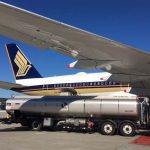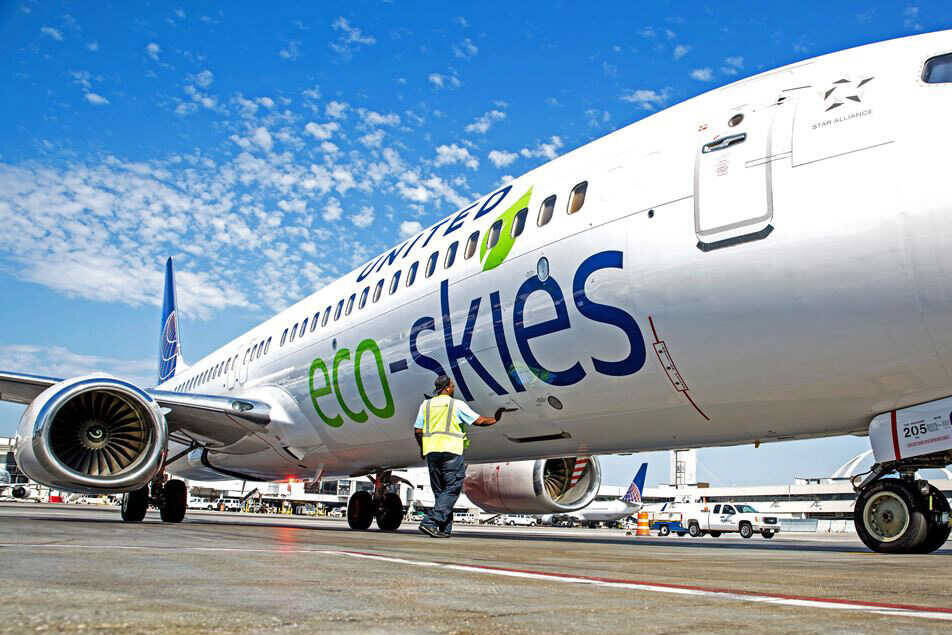In its largest direct investment in sustainable aviation fuels yet, United Airlines Ventures has formed a $50 million joint venture – Blue Blade Energy – with Tallgrass and Green Plains to develop and then commercialise a novel SAF technology that uses ethanol as its feedstock. If the technology, which has been developed by researchers at the US Department of Energy’s Pacific Northwest National Laboratory (PNNL), proves successful then construction of a pilot facility is expected to proceed in 2024, followed by a full-scale facility that could begin commercial operations by 2028. Once operational, Blue Blade Energy has the potential to create United’s largest source of SAF by providing up to 135 million gallons annually, said Michael Leskinen, President of United Airlines Ventures, the airline’s corporate venture arm. As well as agreeing to purchase up to 2.7 billion gallons of SAF produced by the joint venture in total, United will assist with SAF development, fuel certification and into-wing logistics.
“The production and use of SAF is the most effective and scalable tool the airline industry has to reduce carbon emissions and United continues to lead the way,” said Leskinen. “This new joint venture includes two expert collaborators that have the experience to construct and operate large-scale infrastructure, as well as the feedstock supply necessary for success.”
The offtake agreement could provide for enough unblended SAF to fly more than 50,000 flights annually between United’s hub airports in Chicago and Denver, said the airline.
Under the collaboration, energy infrastructure company Tallgrass will manage research and development of the PNNL technology, including pilot plant development, and will manage the construction of the production facility.
“At Tallgrass, we are striving to innovate how we deliver the energy that powers our nation and enables our quality of life,” said Alison Nelson, VP Business Development. “Air travel uniquely connects people and improves lives, and the advancement of this novel SAF technology presents a meaningful opportunity to reduce emissions from aviation.”
If the technology is commercialised, Green Plains will supply the low-carbon ethanol feedstock for Blue Blade Energy from its Midwest ethanol production facilities. While the initial SAF facility intends to use ethanol, the technology has the capability to work with any alcohol-based feedstock as its feedstock, added the company.
Having started operations in Iowa in 2007, Omaha-headquartered Green Plains has 11 biorefineries throughout the United States, processing 300 million bushels of corn per year and capacity to produce nearly 1 billion gallons of low-carbon biofuels annually.
“Our transformation to a true decarbonised biorefinery model has positioned Green Plains to help our customers and partners reduce the carbon intensity of their products by producing low-carbon proteins, oils, sugars and now decarbonised ethanol to be used in SAF,” said the company’s CEO, Todd Becker. “The potential impact of this project is a gamechanger for US agriculture, aligning a strong farm economy and a robust aviation transport industry focused on decarbonising our skies.”
In September 2022, Green Plains, Tallgrass and PNNL were awarded funding from the US Department of Energy to support development of the PNNL technology, which converts cellulosic and corn ethanol to SAF via ketone intermediates. Green Plains and Tallgrass currently hold the option to exclusively license the technology globally.
“New alcohol-to-jet pathways are necessary to achieve the ambitious volume targets for SAF, and our rapidly-evolving biorefinery platform is well positioned to help meet and exceed these targets,” said Becker. “Our collaboration with Tallgrass and our work with PNNL on state -of-the-art technologies positions Green Plains at the forefront of SAF commercialisation, which is supported by the expansion of policy to economically develop and deploy novel SAF technology.”
Photo: United Airlines















More News & Features
Lessons learned from the collapse of Fulcrum BioEnergy
Early data shows uncertainty that UK SAF mandate can be met in its first year
Swiss advanced SAF technology startups Metafuels and Synhelion reach project milestones
PtX fuels have significant Asia-Pacific potential but face many barriers, finds report
Airfreight giants DHL Express and FedEx announce big US SAF deals
Asia-Pacific study reveals pessimistic outlook for SAF uptake by 2030 as Singapore details levy